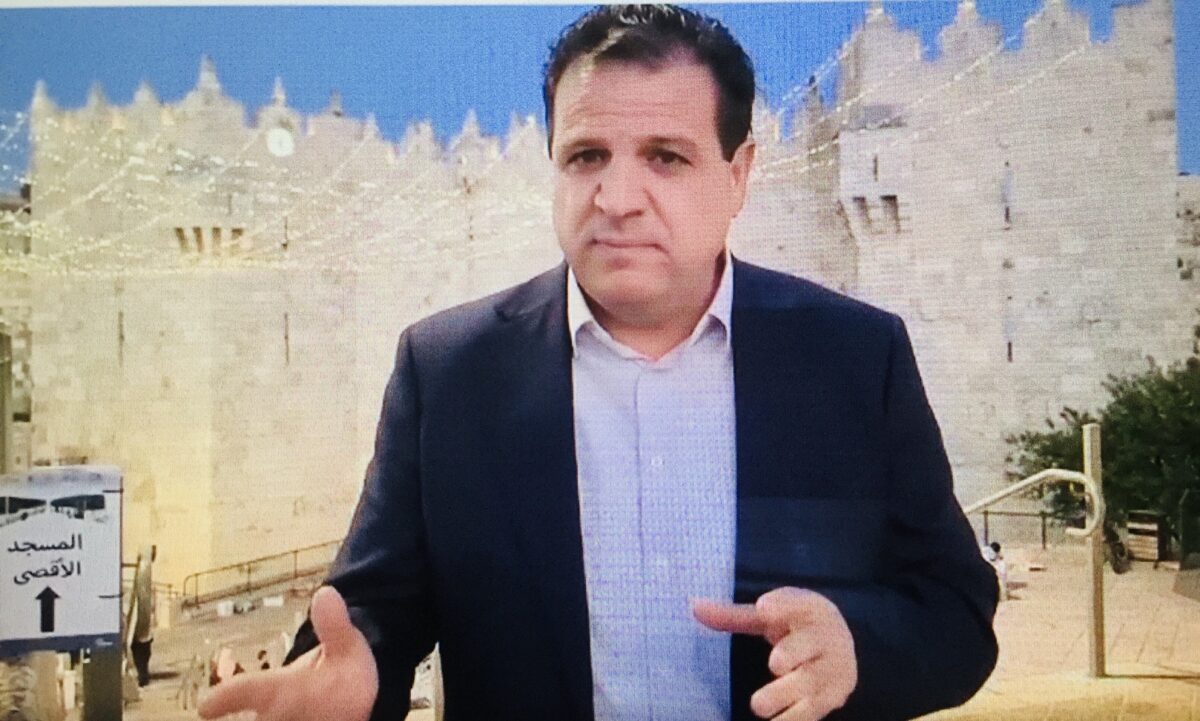Ayman Odeh, the leader of the Joint List, a coalition of three Arab political parties with six seats in Israel’s parliament, ignited outrage recently when he posted a video on his Facebook page urging Israeli Arabs in the security forces not to serve in the occupied West Bank and East Jerusalem.
Standing near the Damascus Gate, one of the gateways to the Old City in Jerusalem and the scene of recent clashes between Palestinians and Israeli police officers, Odeh claimed they were “harming” and “humiliating” themselves and their people by serving outside of Israel’s pre-1967 borders.
Doubling down on his comment, Odeh subsequently asked Israeli Jews employed in the security services to comply with his request.
To no one’s surprise, Odeh’s remark caused consternation in Israeli political circles, both on the right and the left.
Interior Minister Ayelet Shaked, Prime Minister Naftali Bennett’s colleague in the far-right Yamina Party, charged Odeh with inflaming violence and said he does not belong in the Knesset.
Deputy Economy Minister Yair Golan, a member of the left-wing Meretz Party, called upon Odeh to join Bennett’s coalition government so as “to strengthen the integration of Arab Israeli citizens into Israeli society.”

Odeh certainly exposed himself to opprobrium with this controversial recommendation. With Israel reeling from a wave of terrorist attacks that have killed 14 people since the third week of March, Jewish Israelis are on edge and regard such opinions as inappropriate at best and treasonous at worst.
Realistically, no one should be shocked or exasperated by the words that came out of Odeh’s mouth.
Odeh, a lawyer from Haifa who stands on the far left of the spectrum, did not say anything that could be even faintly construed as surprising. He merely reiterated what he has stated ad infinitum in the past.
As his parliamentary colleague, Sami Abou Shehadeh, put it, “This is our historic position, nothing is new here.”

Odeh, first and foremost, is a Palestinian Arab and a Palestinian nationalist, his Israeli citizenship notwithstanding. He commiserates with the plight of Palestinian Arabs in the West Bank under Israeli rule.
As he said the other day, “We need peace and there is no way to do so without ending the occupation and establishing a Palestinian state alongside Israel.”
The majority of Israeli Arabs and Jews agree with his view. Israel’s chief ally, the United States, supports a two-state solution, as do the major powers and virtually every country on this planet.
To its detriment, Israel is an isolated outlier on this crucial issue.
Bennett, a champion of the settlement movement in the West Bank, opposes not only Palestinian statehood but talks to end Israel’s long-running conflict with the Palestinians. What he offers Palestinians is a form of colonial autonomy, which no self-respecting Palestinian would ever accept.
His centrist colleague from the Yesh Atid Party, Foreign Minister Yair Lapid, appears content with the status quo, which is unsustainable and dangerous.
Bennett and Lapid claim that Israel has no Palestinian partner with whom to negotiate a peace agreement, but that is untrue. The Palestinian Authority, led by President Mahmoud Abbas, has recognized Israel’s existence and is ready and willing to settle for a sovereign state on the West Bank, with East Jerusalem as its capital.
(Hamas, the governing authority in the Gaza Strip, does not recognize Israel’s existence, remains firmly in the rejectionist camp, and is not prepared to negotiate and end-of-conflict agreement).
Israel must realize, sooner or later, that its occupation of the West Bank is counter-productive. It breeds resentment, anger, frustration and violence among Palestinians and prolongs the Arab-Israeli dispute. And it undermines Israel’s status as a Jewish democratic state and paints Israel as an oppressive occupier.

Odeh broadly spoke to this grim and depressing situation when he issued his latest statement from the Damascus Gate. It aroused indignation, in particular, among right-wing Israelis who happily endorse the occupation and falsely equate Palestinian statehood with national suicide.
In all fairness, Odeh should not be reflexively condemned for having addressed a facet of such an important issue. It needs to be discussed on a serious basis far more often than it has been in recent years.
